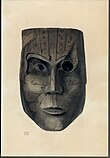Devil's Den Cave

Devil's Den is formed by a karst window, in which the roof over a subterranean river has collapsed, exposing the water to the open surface, near Williston, Florida. It is privately owned, and operated as a SCUBA diving training and recreational facility.
The water in the underground river is geothermically warmed at a constant 72 °F (22 °C) degrees. But in cold weather, water vapor rising from the surface of the river forms a visible plume above the entrance to the cave, which suggested a chimney from Hell to early settlers. The opening to the surface was originally a small solution sinkhole, through which visitors had to squeeze to reach the water. The opening was enlarged in the 1990s to ease access. The cave expands below water level (a shape described as an "inverted mushroom") to up to 200 feet (61 m) across. The maximum depth of the cave reaches 54 ft/16.5 m with the surface diameter being 120 ft. The water level in the cave has fallen along with the water table in the area. However, as of 2018 the water level has risen above the main stage/platform. The cave was opened to the public as a dive site in the early 1990s.[1]
Four underwater passages extend from the pool under the opening, from 5 feet (1.5 m) to 90 feet (27 m) under the surface of the water. The passage called chamber 3, 70 feet (21 m) under water, contained animal and human remains and artifacts. The animal remains, which appeared to be associated with the human remains and artifacts, were from extinct (Pleistocene) species, including mastodons, ground sloths, camels, horses, dire wolves, bog lemmings, Florida spectacled bears, saber-toothed cats, and peccaries. One study dated the human remains to about 7,500 BC. A more recent study analyzing rare earth elements in the bones found in the cave concluded that the bones of humans and of Pleistocene animals were of about the same age, about 13,000 years old.[1][2][3][4]
References[edit]
- ^ a b Walden, Linda Lee. "Devil's Den: Underground and Open Air". Dive sites Across America. Dive Training Magazine. Archived from the original on 27 September 2011. Retrieved 19 June 2011.
- ^ Purdy, Barbara A. (2008). Florida's People During the Last Ice Age. Gainesville, Florida: University Press of Florida. ISBN 978-0-8130-3204-7.
- ^ Kurtén, Björn; Elaine Anderson (1980). Pleistocene Mammals of North America. New York: Columbia University Press. p. 56. ISBN 0-231-03733-3. Retrieved 26 January 2013.
- ^ Purdy, Barbara A.; Rohlwing, Kathryn M.; MacFadden, Bruce J. (2015-07-01). "Devil's Den, Florida: Rare Earth Element Analysis Indicates Contemporaneity of Humans and Latest Pleistocene Fauna". PaleoAmerica. 1 (3): 266–275. doi:10.1179/2055556315Z.00000000032. ISSN 2055-5563.
External links[edit]
29°24′27.45″N 82°28′35.29″W / 29.4076250°N 82.4764694°W


 French
French Deutsch
Deutsch